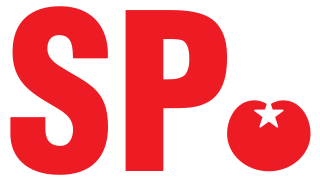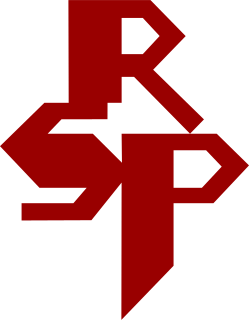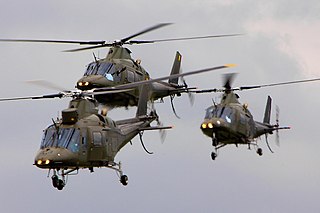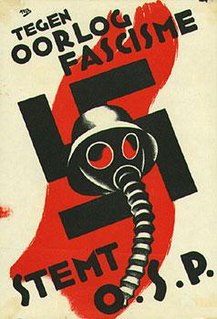Origins
The LSP-PSL was founded in 1992 as Militant Left (Militant Links), an offshoot from the Spark (Vonk) which operated as a Marxist tendency within the Belgian Socialist Party. Following the Socialist Party’s swing to the right, discontent within the Spark culminated in a split, largely over the strategy of entryism under the changed circumstances. One group continued as the Spark, working within the Socialist Party, whilst another left to form Militant Left, later renaming themselves the Left Socialist Party (Linkse Socialistische Partij). The LSP was at first active only in the cities of Ghent and Geraardsbergen, but has since grown into a national party. In 1999 the party formally gained its francophone section, Movement for a Socialist Alternative (Mouvement pour une Alternive Socialiste), renamed Socialist Party of Struggle (Parti Socialiste de Lutte) in 2009.
Electoral alliances
The LSP-PSL aims to build left unity around a common minimum programme, while maintaining the right of groups to organise and campaign on their own platforms. To this end, the party has sought to engage with other radical left parties and has met with some success in creating electoral alliances with the Communist Party, Humanist Party and Revolutionary Communist League. The LSP-PSL contested the 2007 federal elections as part of a new political movement, the Committee for Another Policy, though it subsequently left at the end of the year. Later, it participated in the Left Front, with which it stood in the federal elections in 2010. In the 2014 federal elections, the LSP/PSL did not participate, calling for a vote for the Workers' Party of Belgium or other small left parties instead, despite the PTB/PvdA having rejected the LSP-PSL's proposal for a common list.
Young people
The party emphasises youth work and in universities has a youth network named Active Left Students (Étudiants de Gauche Actifs - Actief Linkse Studenten, EGA-ALS). EGA-ALS takes up issues concerning education, but also campaigns on wider social issues such as sexism and racism, including forming organised opposition to the far-right Nationalist Student Association. In 2010, along with trade union and leftwing youth groups Comac, Écolo j, Jeunes-FGTB and JOC, the PSL launched Jeunes en Lutte pour l'Emploi to campaign on the issue of youth unemployment, taking as its inspiration the Youth Fight for Jobs campaign in Great Britain.
The French Trotskyist political party Union Communiste is usually known as Lutte Ouvrière, after the name of its weekly paper. Arlette Laguiller has been the party's spokeswoman since 1973 and ran in each presidential election until 2012, when Nathalie Arthaud was the candidate. Robert Barcia (Hardy) was its founder and central leader. Lutte Ouvrière is a member of the Internationalist Communist Union. It emphasises workplace activity and has been critical of such recent phenomena as alter-globalization.
The Revolutionary Communist League was a Trotskyist political party in France. It was the French section of the Fourth International (Post-Reunification). It published the weekly newspaper Rouge and the journal Critique communiste. Established in 1974, it became the leading party of the far-left in the 2000s. It officially abolished itself on 5 February 2009 to merge with smaller factions of the far-left and form a New Anticapitalist Party.

The Socialist Party is a democratic socialist political party in the Netherlands. Founded in 1971 as the Communist Party of the Netherlands/Marxist–Leninist, the party has since moderated itself from Marxism–Leninism and Maoism towards democratic socialism and social democracy. The SP has also been described as left-wing populist and soft Eurosceptic, and is an advocate of Dutch republicanism.

The Workers' Party of Belgium is a Marxist and socialist political party in Belgium. It is one of the few Belgian parties that is a fully national party, representing both Flanders and Wallonia. Having traditionally been a small party, the PTB-PVDA has gained momentum since the 2010s, continuously scoring better at the polls and elections, particularly in Wallonia and working-class communities in Brussels.

Flanders is both a cultural community and an economic region within the Belgian state, and has significant autonomy.

Flemish political parties operate in the whole Flemish Community, which covers the unilingual Flemish Region and the bilingual Brussels-Capital Region. In the latter, they compete with French-speaking parties that all also operate in Wallonia. There are very few parties that operate on a national level in Belgium. Flanders generally tends to vote for right-wing, conservative parties, whereas in French-speaking Belgium the socialist party is usually the most successful one.

The Revolutionary Socialist Party was a Dutch socialist political party, that has been variously characterized as Trotskyite and syndicalist. In 1935 it merged with the Independent Socialist Party (OSP) to form the Revolutionary Socialist Workers' Party, but most of the former OSP members left the united party the same year. Henk Sneevliet was the RSP/RSAP's undisputed leader throughout its existence, as well as its only Representative.

The Belgian Socialist Party was a social-democratic political party which existed in Belgium from 1945 to 1978. During its time in office, a number of progressive social reforms were introduced.

The Agusta scandal, alternatively known as the Agusta–Dassault Case, was a major political scandal which occurred in Belgium during the 1990s, based on allegations that two multinational companies had used bribery to secure large defence procurement contracts. The companies in question, Agusta and Dassault, bribed numerous political office-holders in 1988 in order to secure a large order of Agusta A109 helicopters and the contract for re-fitting Belgian F-16 Fighting Falcon fighter jets respectively. The scandal came to light during investigations into the death of the socialist politician André Cools in 1991 and an official enquiry was opened in 1993. Numerous senior figures in both Walloon and Flemish socialist parties were implicated, including the incumbent Secretary General of NATO Willy Claes who was forced to resign.

Federal elections were held in Belgium on 10 June 2007. Voters went to the polls in order to elect new members for the Chamber of Representatives and Senate.

The Independent Socialist Party was a revolutionary socialist political party in the Netherlands.
The Rally of Republican Lefts was an electoral alliance during the French Fourth Republic composed of the Radical Party, the Independent Radicals, the Democratic and Socialist Union of the Resistance (UDSR) and several conservative groups. Headed by Jean-Paul David, founder of the anti-Communist movement Paix et Liberté, it was in fact a right-of-center conservative coalition, which presented candidates to the June 1946, November 1946, and 1951 legislative elections.

The Mouvement Jeunes communistes de France (MJCF), commonly called the "JC", is the first political youth organisation of France, close to the French communist party.

The Charter of Quaregnon is a political manifesto agreed to in 1894 that formed the doctrinal basis for successive socialist parties in Belgium until 1979.
The Parti socialiste du Québec was a provincial party in Quebec. The PSQ was founded in November 1963 as the result of a split at the founding conference of the original New Democratic Party of Quebec, held in June 1963, over the issue of Quebec self-determination with Michel Chartrand, former leader of the Parti social démocratique du Québec, among the nationalists supporting self-determination.

The Republican and Socialist Left is a socialist political party in France. It was founded on 3 February 2019 after the merger of the Alternative for a Republican, Ecologist and Socialist Program (APRÉS) and the Citizen and Republican Movement (MRC) of Jean-Luc Laurent and Jean-Pierre Chevènement. APRÉS had been founded in October 2018 by Emmanuel Maurel and Marie-Noëlle Lienemann after their departure from the Socialist Party and was close to La France Insoumise.
This page is based on this
Wikipedia article Text is available under the
CC BY-SA 4.0 license; additional terms may apply.
Images, videos and audio are available under their respective licenses.












